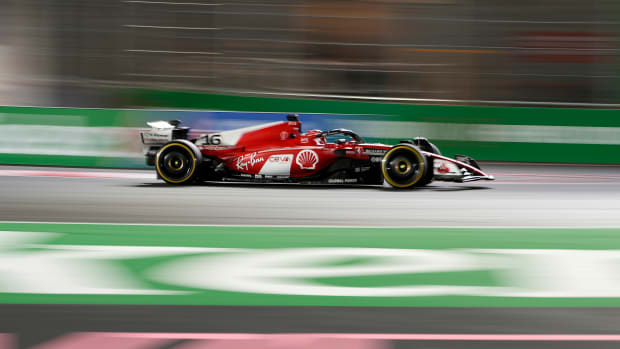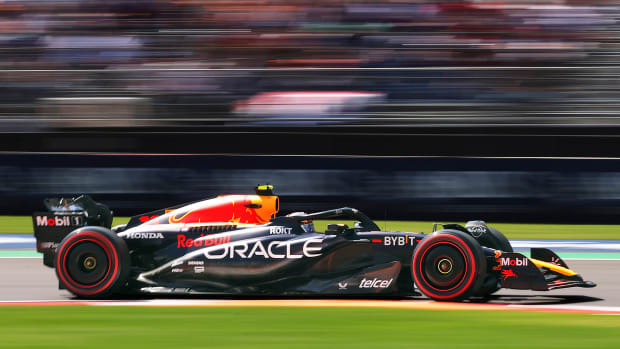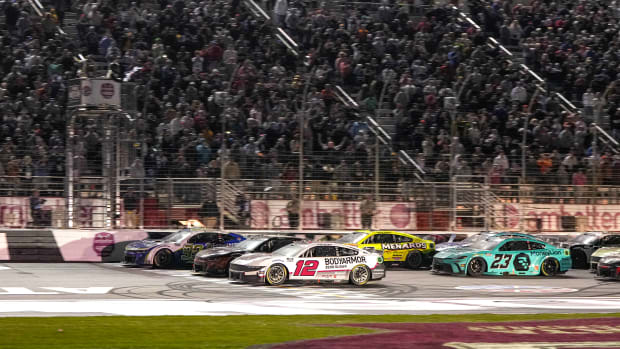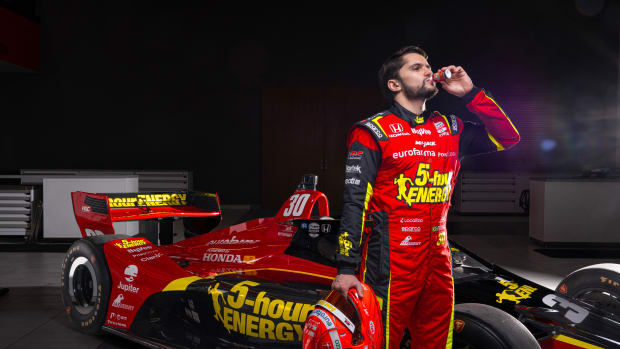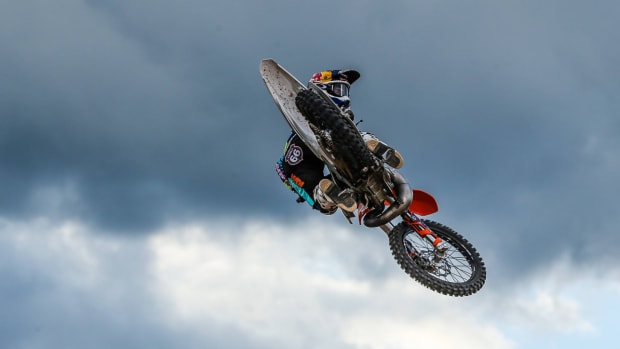Sprint Cup's dominant big four teams facing challenges
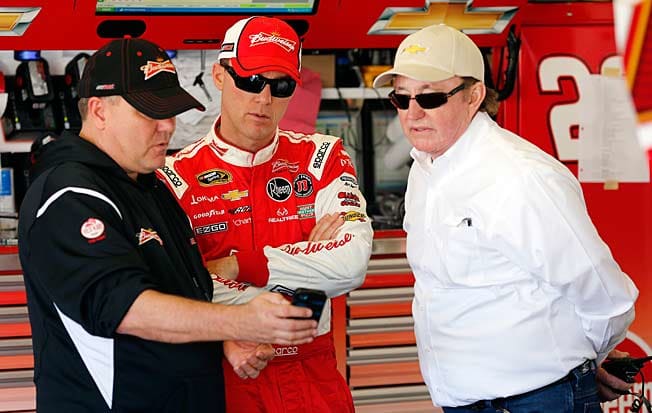
When Kevin Harvick leaves, Richard Childress (right) could find his organization is in serious trouble.
Sam Greenwood/Getty Images
For more than two decades, NASCAR's Sprint Cup Series has been dominated by four race teams: Hendrick Motorsports, Joe Gibbs Racing, Richard Childress Racing and Roush Fenway Racing. From 1990 through the 2010 season, the Cup champion emerged from one of those four organizations in all but two seasons. (Alan Kulwicki won the title in 1992 as an owner-driver, and Dale Jarrett captured the crown in 1999 while driving for Robert Yates.)
Sure, there have always been a few other teams that occasionally made some noise. Penske Racing picked up 18 victories in 1993-94 with Rusty Wallace behind the wheel, and had an eight-win season with Ryan Newman in 2003. Dale Earnhardt Jr. helped power his father's old team, Dale Earnhardt Inc., to 21 wins from 2000 through 2004. And, of course, Petty Enterprises (now known as Richard Petty Motorsports) continues to plug away, having been around since the earliest days of NASCAR.
But for the most part, the big four have ruled the sport since 1990. It has been similar to the run that the NBA saw in the 1980s and '90s, when the Celtics, Lakers, Pistons and Bulls gobbled up most of the championships and nearly all of the recognition. There are signs, however, that the big four's grip on the Sprint Cup Series is starting to loosen. Tony Stewart channeled his inner Kulwicki to win the 2011 championship as an owner-driver (though his Stewart-Haas Racing team has considerably more resources that Kulwicki's old outfit did). Last season, Roger Penske finally won his first Cup championship after 40 years in the sport, and in Brad Keselowski he has one of the brightest young stars in NASCAR.
Then there is Michael Waltrip Racing, which began in 2002 but did not start operating as a true full-time team until 2007. After five largely uneventful seasons, MWR broke through last year by placing both of its drivers in the Chase, with Clint Bowyer winning three times and finishing second in the point standings.
"Last year we snuck up on everybody, but all of us had a lot of hope and anticipation for the 2012 season," Waltrip said earlier this year. "We knew as a group we had the best cars we'd ever prepared. We had the best crew lineup and the best driver lineup. So we were very confident that we would be more competitive in 2012, but I didn't talk a lot about it. People think I'm weird anyway. If I said where I thought we were going to finish, you'd have really thought I had a screw loose."
Suddenly, the big four is no more. That group is still going to win a majority of Sprint Cup races (though Childress is in danger of falling from the ranks of the elite), but we definitely are starting to see some cracks in this modern-day Mount Rushmore of NASCAR. As recently as 2008, those four teams won 32 of the 36 Cup races (89 percent). Over the past two seasons, they have won 44 of 72 races (61 percent).
Usually we rate the individual drivers each week in the Power Rankings. But those rankings are unchanged after the Sprint All-Star race (and the top spot might not change the rest of the season, given the way that All-Star-winner Jimmie Johnson is going). So, this week we're going to take a quick look at how the major players among the Sprint Cup teams stack up.
1. Hendrick Motorsports -- Hendrick remains the gold standard in the sport. All four of the team's drivers -- Johnson, Earnhardt, Kasey Kahne and Jeff Gordon -- made the Chase last season and are on pace to do so again this year. In fact, Hendrick drivers occupy three of the top six spots in the standings. You know you are talking about a powerful lineup when the team's potential weakest link is Gordon, a four-time Cup champion who currently is 12th in the standings.
2. Joe Gibbs Racing -- Gibbs probably does not get enough credit for his success as a team owner. While his record alone is impressive (105 career victories, three Cup championships), he has also been able to smoothly handle a wide variety of personalities, including the temperamental Stewart and Kyle Busch. This year, Gibbs added the laid-back Matt Kenseth to the lineup, and all Kenseth has done is win three of the first 11 races. Busch has won two others, giving JGR victories in nearly half the races this season. And it has all happened with Denny Hamlin, the 2010 Sprint Cup runner-up, missing four races due to a back injury.
3. Roush Fenway Racing -- Losing Kenseth after last season certainly was a blow, but Roush has found a potential star in rookie Ricky Stenhouse Jr. while Carl Edwards remains one of the premier drivers in the sport and is likely to win a championship before his career is over. And Greg Biffle might be the most underrated driver in NASCAR. RFR will probably never be the top organization in Sprint Cup, primarily because Jack Roush tends to be slightly stingier with the money than Hendrick and Gibbs, but it will continue to be near the top.
4. Penske Racing -- With only two full-time Sprint Cup drivers, Penske is not as deep as the other top teams. So if one driver is having a mediocre season, then it is hard to elevate the entire organization. Still, after scuffling through some lean seasons from 2005-08, there is no doubt that Penske has re-emerged as one of the best in the business. Defending Sprint Cup champion Brad Keselowski should be a contender for another 10 years or so, and Joey Logano still has time to live up to his initial hype. (He turns 23 on Friday.)
5. Michael Waltrip Racing -- As a driver, Waltrip endured a 15-year, 462-race winless streak before finally picking up his first Cup win in the 2001 Daytona 500. So it is no surprise that he was willing to endure some terrible early seasons (a total of one top-5 finish and eight top-10s in 2007 and 2008 combined) before things started to improve. Now he has a legitimate star in Bowyer, and Martin Truex Jr. has the potential to make the Chase on a regular basis. Adding Brian Vickers as a third full-time driver next season, as Waltrip wants to do, would strengthen the lineup.
6. Richard Childress Racing -- The man who won six Cup championships with Dale Earnhardt Sr. as his driver has hit tough times lately. The organization has posted only two victories in its past 57 races, both by Kevin Harvick, who has already announced that he is leaving after this season. In fact, 11 of RCR's 12 wins since 2009 have been by either Harvick or the departed Bowyer. Childress is left with Paul Menard, who is decent but not great, and 45-year-old Jeff Burton, who hasn't been much of a factor in five years. Childress' grandchildren, brothers Austin and Ty Dillon, better be good when they move into Cup in the near future, or else this organization could be in serious trouble.
7. Stewart-Haas Racing -- Speaking of being in trouble, what has happened to this team all of a sudden? Stewart captured the Cup championship in 2011, and he and Ryan Newman combined to win 17 races in the organization's first four years of existence. But things have fallen apart so far this season. Newman is 17th in the point standings, Stewart is 21st (with only one top-10 finish), and Cup rookie Danica Patrick is 28th. The expected arrival next year of Harvick should help, but at the moment, this team is going in the wrong direction.

